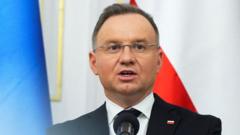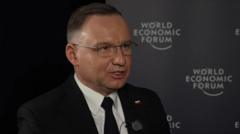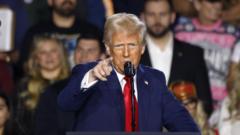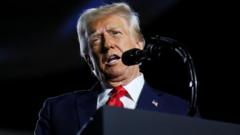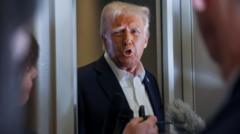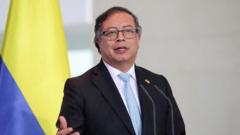Trump's recent statements raise questions about the feasibility of peace talks and the potential for new U.S. sanctions on Russia.
Trump Urges Putin to Halt 'Ridiculous War' in Ukraine Amid Sanction Threats
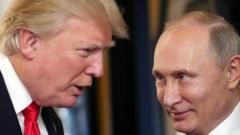
Trump Urges Putin to Halt 'Ridiculous War' in Ukraine Amid Sanction Threats
Former U.S. President Donald Trump signals potential economic repercussions for Russia if it does not resolve the conflict in Ukraine.
In a pointed message delivered via his social media platform Truth Social, former U.S. President Donald Trump has called on Russian President Vladimir Putin to end the "ridiculous war" in Ukraine or face significant new tariffs and sanctions. The comments come as tensions continue to escalate in the ongoing conflict, which began with Russia's full-scale invasion of Ukraine in February 2022.
Trump characterized his push for a quick resolution as a "very big favour" to Russia and Putin. Historically, Trump has expressed his desire to negotiate peace in Ukraine and previously claimed he could resolve the conflict within a single day. While Russia has yet to formally respond to Trump's latest statements, some Russian officials have hinted at an openness to discussions with the new U.S. administration.
During a recent news conference, Trump indicated he might soon be communicating again with Putin, stating it is "likely" he would impose further sanctions if no dialogue is initiated. On Truth Social, Trump expanded on his remarks, emphasizing that Russia's economy is suffering and warning that a lack of agreement could result in severe economic penalties, including high tariffs on Russian imports.
Ukraine's leadership, however, is skeptical. President Volodymyr Zelensky asserted that any viable peace agreement would require a significant international presence, specifically mentioning that at least 200,000 peacekeepers—ideally including U.S. military personnel—would be necessary to deter ongoing Russian aggression. Zelensky's concerns highlight the complicated dynamics of negotiating peace, especially against the backdrop of Russian claims over Ukrainian territories.
While Ukrainian officials have appreciated Trump's assertive tone—believing Putin responds to strength—there is a prevailing sentiment in Kyiv that more concrete actions are needed rather than mere rhetorical threats. Many Ukrainians have reacted to Trump's comments with cynicism, arguing that mere sanctions represent an inadequate response to what they view as Russian aggression.
Domestically in Russia, there are emerging signs that the Kremlin may be willing to settle for less than an outright military victory, indicating a pragmatic approach among some, including pro-Putin media figures. This contrasts sharply with hardliners who condemn any perception of defeatism or compromise.
Trump's statements also touched on themes of affection for the Russian people and references to historic Soviet sacrifices during World War Two, but his comments suggest a shifted stance toward a more confrontational posture against Russia, calling for an immediate resolution to the conflict.
The significance of Trump's position in U.S. politics and potential future negotiations cannot be understated. Both the history of protracted conflict and the impact of insufficiently robust peace treaties over the past eleven years have left many Ukrainians doubtful about the prospects of genuine peace.
Trump characterized his push for a quick resolution as a "very big favour" to Russia and Putin. Historically, Trump has expressed his desire to negotiate peace in Ukraine and previously claimed he could resolve the conflict within a single day. While Russia has yet to formally respond to Trump's latest statements, some Russian officials have hinted at an openness to discussions with the new U.S. administration.
During a recent news conference, Trump indicated he might soon be communicating again with Putin, stating it is "likely" he would impose further sanctions if no dialogue is initiated. On Truth Social, Trump expanded on his remarks, emphasizing that Russia's economy is suffering and warning that a lack of agreement could result in severe economic penalties, including high tariffs on Russian imports.
Ukraine's leadership, however, is skeptical. President Volodymyr Zelensky asserted that any viable peace agreement would require a significant international presence, specifically mentioning that at least 200,000 peacekeepers—ideally including U.S. military personnel—would be necessary to deter ongoing Russian aggression. Zelensky's concerns highlight the complicated dynamics of negotiating peace, especially against the backdrop of Russian claims over Ukrainian territories.
While Ukrainian officials have appreciated Trump's assertive tone—believing Putin responds to strength—there is a prevailing sentiment in Kyiv that more concrete actions are needed rather than mere rhetorical threats. Many Ukrainians have reacted to Trump's comments with cynicism, arguing that mere sanctions represent an inadequate response to what they view as Russian aggression.
Domestically in Russia, there are emerging signs that the Kremlin may be willing to settle for less than an outright military victory, indicating a pragmatic approach among some, including pro-Putin media figures. This contrasts sharply with hardliners who condemn any perception of defeatism or compromise.
Trump's statements also touched on themes of affection for the Russian people and references to historic Soviet sacrifices during World War Two, but his comments suggest a shifted stance toward a more confrontational posture against Russia, calling for an immediate resolution to the conflict.
The significance of Trump's position in U.S. politics and potential future negotiations cannot be understated. Both the history of protracted conflict and the impact of insufficiently robust peace treaties over the past eleven years have left many Ukrainians doubtful about the prospects of genuine peace.





